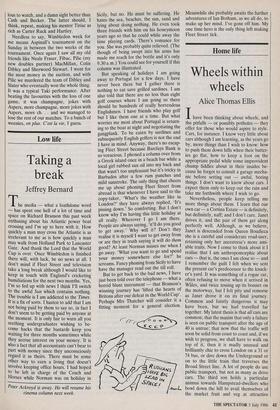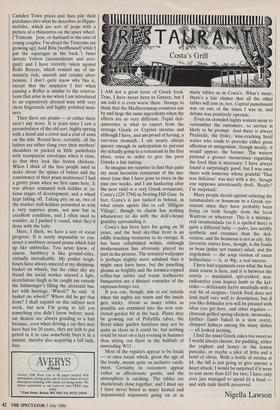Home life
Wheels within wheels
Alice Thomas Ellis
I have been thinking about wheels, and the pitfalls — or possibly potholes — they offer for those who would aspire to style. Cars, for instance. I know very little about cars although I am learning, as the years go by, more things than I wish to know: how to push them down hills when their batter- ies go flat, how to keep a foot on the appropriate pedal while some improvident chump fiddles about in their insides be- cause he forgot to consult a garage mecha- nic before setting out — awful, boring things. I don't want to know about cars. I expect them only to keep out the rain and take me forthwith where I wish to go.
Nevertheless, people keep telling me more things about them. I learn that our own car — a Cortina Estate — is definitely, but definitely, naff; and I don't care. Janet drives it, and the pair of them get along perfectly well. Although, as we believe, Janet is descended from Queen Boudicca she is a careful and considerate road-user, retaining only her ancestress's more ami- able traits. Now I come to think about it I realise that I am anthropomorphic about cars — that is, the ones I am close to — and I remember the guilt I felt when we sent the present car's predecessor to the knack- er's yard. It was something of a rogue car, often refusing to move when it arrived in Wkes, and twice tossing up its bonnet on the motorway, but I felt pity and remorse as Janet drove it on its final journey. Common and faintly dangerous it may have been, but we had travelled far together. My latest thesis is that all cars are common; that the maxim that only a failure is seen on public transport after the age of 40 is untrue; that now that the traffic will soon be solid from coast to coast and, if we wish to progress, we shall have to walk on top of it, then it is madly unusual and brilliantly chic to cross London on a 31 or 74 bus, or dive down the Underground or on to the little train that traverses the Broad Street line. A lot of people do use public transport, but not as many as drive cars. The third son holds a particular animus towards Hampstead-dwellers who bowl down the hill to avail themselves of the market fruit and veg at attractive Camden Town prices and then pile their purchases into what he describes as Hippo- mobiles, which are sort of jeeps with a picture of a rhinoceros on the spare wheel. CTristram [son, or husband in the case of young couples: I'm afraid the Tristrams are growing up], hold Rita [wolfhound] while I put the asparagus in the back.') Janet detests Volvos (inconsiderate and arro- gant) and I have recently taken against Rolls Royces, which remind me of im- mensely rich, smooth and creamy abor- tionists. I don't quite know why this is, except that the suspicion I feel when passing a Roller is similar to the reserva- tions that arise in me when I am introduced to an expensively dressed man with very clean fingernails and highly polished man- ners.
Then there are prams — or rather there aren't any more. It is years since I saw a perambulator of the old sort, highly sprung with a hood and a cover and a coat of arms on the side. Round here, certainly, all the babies are either slung over their mothers' shoulders or packed in little pushchairs with transparent envelopes when it rains, so that they look like frozen chickens. When I think of the fuss people used to make about the spines of babies and the consistency of their pram mattresses! I had a grotty pram when we first came here. It was always crammed with kiddies at va- rious stages of development, and a wheel kept falling off. Taking pity on us, two of the market stall-holders presented us with a very superior pram, not new but in excellent condition, and I often used to wonder, as I pushed it round, what they'd done with the baby.
Here, I think, we have a sort of social progress. It is surely impossible to con- struct a snobbery around prams which fold up like umbrellas. You never know, of course. Snobbery is like ground-elder, virtually ineradicable. My posher neigh- bours have always sneered at my shopping- basket on wheels, but the other day my friend the social worker uttered a light, incredulous laugh as he caught me outside the fishmonger's filling the aforesaid bas- ket with herrings. 'Wheels?' he said. 'A basket on wheels?' Where did he get that from? I shall expand on this subject next week, but now I'm going to tell you something you didn't know before: used- car dealers are always grinding to a halt because, even when driving a car they may have had for 20 years, they are loth to put petrol in it in case somebody buys it in a minute, thereby also acquiring a full tank, free.



















































 Previous page
Previous page